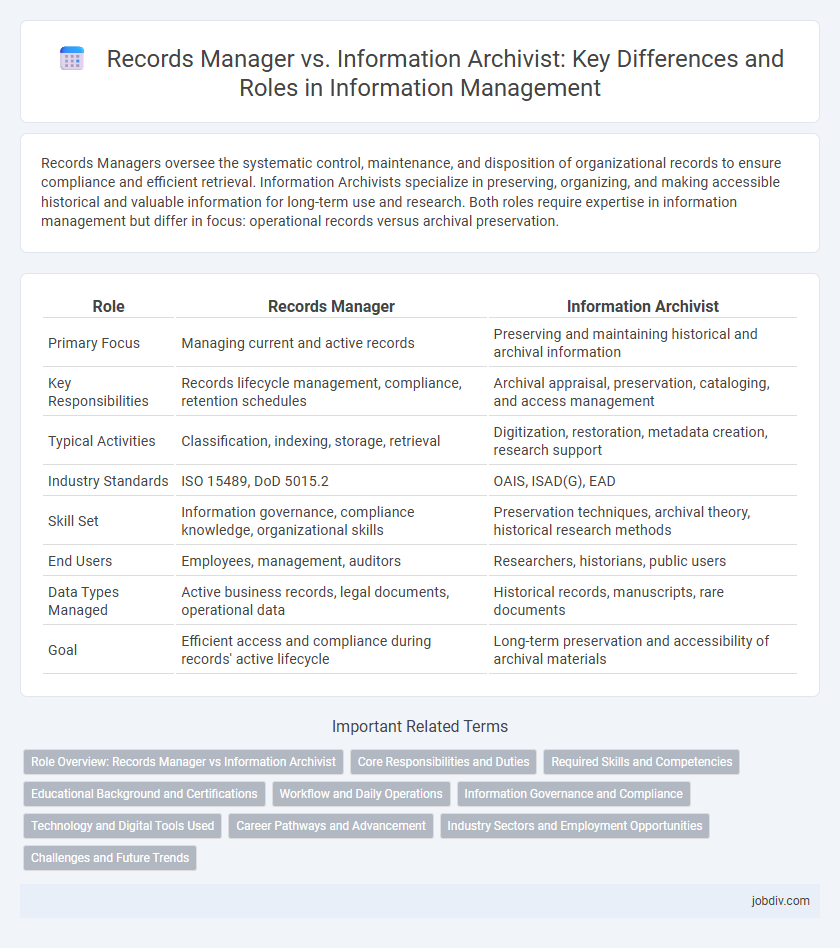Records Managers oversee the systematic control, maintenance, and disposition of organizational records to ensure compliance and efficient retrieval. Information Archivists specialize in preserving, organizing, and making accessible historical and valuable information for long-term use and research. Both roles require expertise in information management but differ in focus: operational records versus archival preservation.
Table of Comparison
| Role | Records Manager | Information Archivist |
|---|---|---|
| Primary Focus | Managing current and active records | Preserving and maintaining historical and archival information |
| Key Responsibilities | Records lifecycle management, compliance, retention schedules | Archival appraisal, preservation, cataloging, and access management |
| Typical Activities | Classification, indexing, storage, retrieval | Digitization, restoration, metadata creation, research support |
| Industry Standards | ISO 15489, DoD 5015.2 | OAIS, ISAD(G), EAD |
| Skill Set | Information governance, compliance knowledge, organizational skills | Preservation techniques, archival theory, historical research methods |
| End Users | Employees, management, auditors | Researchers, historians, public users |
| Data Types Managed | Active business records, legal documents, operational data | Historical records, manuscripts, rare documents |
| Goal | Efficient access and compliance during records' active lifecycle | Long-term preservation and accessibility of archival materials |
Role Overview: Records Manager vs Information Archivist
A Records Manager oversees the systematic control, maintenance, and disposal of organizational records to ensure compliance with legal and regulatory requirements. An Information Archivist focuses on the preservation, organization, and accessibility of historical or valuable records for long-term use and research purposes. While Records Managers prioritize active records' lifecycle and current utility, Information Archivists ensure the safeguarding of records with enduring cultural or evidentiary value.
Core Responsibilities and Duties
Records Managers oversee the organization, maintenance, and proper disposal of company records, ensuring compliance with legal and regulatory requirements for document retention. Information Archivists specialize in preserving, cataloging, and providing access to historical documents and digital assets, focusing on long-term preservation and research facilitation. Both roles require expertise in information governance, but Records Managers emphasize active document lifecycle management, while Information Archivists prioritize archival preservation and accessibility.
Required Skills and Competencies
Records Managers require strong organizational skills, proficiency in records classification systems, and knowledge of regulatory compliance to ensure information is properly maintained and accessible. Information Archivists need expertise in preservation techniques, digital asset management, and metadata standards to safeguard historical and valuable data for long-term use. Both roles demand attention to detail, analytical abilities, and familiarity with information governance frameworks to support effective information lifecycle management.
Educational Background and Certifications
Records Managers commonly hold degrees in information management, library science, or business administration, with certifications such as Certified Records Manager (CRM) enhancing their expertise in handling organizational records. Information Archivists typically have academic backgrounds in history, archival science, or library science, often obtaining credentials like the Academy of Certified Archivists (ACA) certification to validate their proficiency in preserving and organizing historical documents. Both roles require specialized education aligned with their focus areas, but Records Managers emphasize operational record-keeping while Information Archivists concentrate on long-term preservation.
Workflow and Daily Operations
Records managers oversee the systematic control of records throughout their lifecycle, ensuring proper classification, retention, and compliance with legal requirements. Information archivists focus on preserving and organizing historically significant data, emphasizing accessibility and long-term storage in specialized archives. Daily operations for records managers involve routine audits, policy implementation, and workflow optimization, while information archivists concentrate on cataloging, digitization, and maintaining metadata for retrieval.
Information Governance and Compliance
Records Managers ensure information governance by systematically organizing, maintaining, and securing active records to meet compliance standards and regulatory requirements. Information Archivists focus on preserving and managing historical data and archives, ensuring long-term accessibility and adherence to legal retention policies. Both roles collaborate to strengthen organizational compliance frameworks, balancing operational records control with strategic information preservation.
Technology and Digital Tools Used
Records Managers utilize electronic records management systems (ERMS) such as OpenText and Microsoft SharePoint to oversee document lifecycle, ensuring compliance and retrieval efficiency. Information Archivists employ digital preservation tools like Archivematica and Preservica to maintain the authenticity and accessibility of digital archives over time. Both roles leverage metadata standards, but Records Managers focus more on active recordkeeping technologies, while Archivists prioritize long-term digital preservation and access solutions.
Career Pathways and Advancement
Records Managers typically advance through roles such as Compliance Officer or Information Governance Specialist, benefiting from expertise in records lifecycle management and regulatory compliance. Information Archivists often progress toward positions like Digital Archivist or Archivist Manager, leveraging skills in preservation, digital asset management, and historical data curation. Both career pathways emphasize specialized knowledge in data organization, with Records Managers focusing on operational processes and Information Archivists prioritizing long-term data accessibility and cultural heritage.
Industry Sectors and Employment Opportunities
Records Managers find employment mainly in corporate sectors such as healthcare, finance, and government agencies where managing day-to-day operational records is critical. Information Archivists are typically employed by cultural institutions, libraries, museums, and educational organizations, specializing in preserving and organizing historical and non-current documents. Both professions offer opportunities in private and public sectors, but Records Managers prioritize active information governance, while Information Archivists focus on long-term preservation and accessibility.
Challenges and Future Trends
Records Managers face challenges in ensuring compliance with evolving regulations and managing digital records' increasing complexity, while Information Archivists struggle with preserving data integrity and accessibility over long periods amid rapid technological changes. Both roles must adapt to emerging trends such as artificial intelligence integration, blockchain for secure record-keeping, and enhanced metadata standards to improve searchability and retention strategies. Future developments emphasize automation, cloud-based storage solutions, and the balance between privacy concerns and data transparency to optimize information lifecycle management.
Records Manager vs Information Archivist Infographic

 jobdiv.com
jobdiv.com